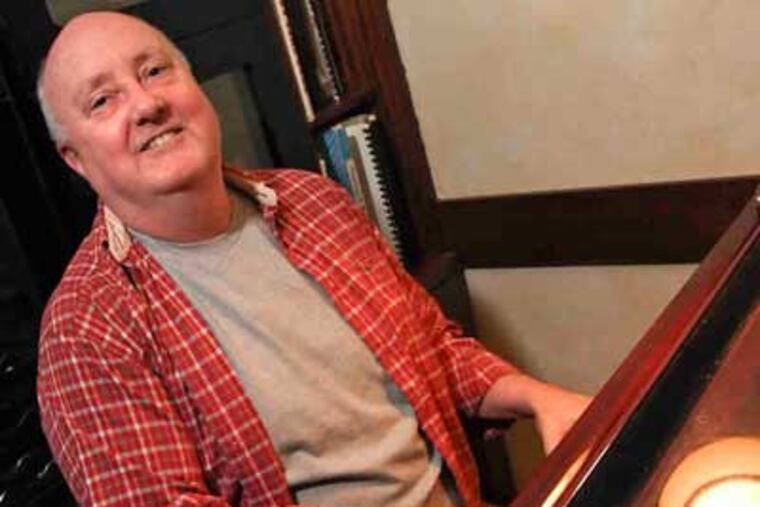Former priest talks about being gay at holidays
AS LAST SATURDAY turned into Sunday in the back room of a dimly lit Center City gay nightspot, a pianist's fingers danced across the keys while dozens of men and a few women joined together in song.

AS LAST SATURDAY turned into Sunday in the back room of a dimly lit Center City gay nightspot, a pianist's fingers danced across the keys while dozens of men and a few women joined together in song.
Hours earlier, Congress had voted to repeal the controversial "Don't Ask, Don't Tell" policy that, for 17 years, had banned openly gay and lesbian soldiers from military service, and a celebratory mood was in the air.
For the pianist, John Bickle, 57, a former Roman Catholic priest in New York and New Jersey, thoughts turned to when, at 24, he was asked about his own sexual orientation upon entering St. Anthony-on-Hudson Seminary in Rensselaer, N.Y.
"They did ask and I didn't tell," the gay pianist recalled, with a laugh. "If I'm committed to being celibate, though, I thought, 'What does it matter if I'm attracted to men, women, or porcupines?' "
On Wednesday, President Obama signed the historic bill officially ending a policy that had led to the dismissal of nearly 14,000 U.S. troops from military service.
Although Bickle never served in the military, he's a veteran of the struggles by gays to attain dignity and respect in American society. Ordained a priest in 1984, he counseled AIDS patients as director of spiritual care at the now-closed St. Vincent's Medical Center, in New York's Greenwich Village.
Tonight and tomorrow night, another group will gather in the same room at Knock Restaurant and Bar, at 12th and Locust streets, to sing Christmas carols with the ex-priest, who performs there regularly on piano.
'Like our own family'
For some older gay men, Bickle said, Christmas can be a lonely time when the rainbow of holiday lights fails to brighten the sky, the mailbox doesn't get stuffed with cards from relatives, and the wintry kisses of loved ones bearing presents are faint memories.
That's why today and tomorrow he'll be caring for the spirit through song.
"I'll play for the people who have nowhere else to go," said Bickle. "It's for the people who've outlived their friends, whose families have disowned them. We're very much like our own family."
The protracted "Don't Ask, Don't Tell" battle, the ongoing debate over gay marriage and the slow march toward equality provoke bittersweet feelings for older gay men, many of whom have painful memories of bias from their youth, and of losing friends and partners to AIDS.
Bickle said he realized as a boy growing up near Binghamton, N.Y., that he was attracted to males. Unlike the parents of many other gays, he said, his Catholic parents were accepting.
In 1974, Bickle graduated with a degree in Russian from Indiana University, where he also taught himself to perform on a seldom-used grand piano in the lobby of his dormitory. While at Indiana, he said, he also felt a calling to the priesthood.
At the seminary, Bickle gravitated toward visiting the homebound and elderly, as well as terminally ill patients in hospitals.
In 1983, he was assigned to St. Bartholomew Parish in Camden, where he spent two years visiting the homebound and dealing with the symptoms of urban decay.
"On the right of the rectory, there was a house of prostitution and on the other side was a crack house," he said. "It was a little bit crazy at times."
Generosity in Camden
While a priest in Camden, Bickle also played piano at an Italian restaurant near Trenton; he donated his paycheck to the church and kept the tips.
He also learned of the "spirit of generosity" in Camden, he said, seeing those with nothing do anything for the church and fellow parishioners.
"In the midst of poverty, illness and sickness and want, there was this great exuberance," he said.
At later assignments at hospitals in Trenton and Camden, Bickle said, he prayed over gunshot victims, caressed elderly hands and blessed chubby newborns.
He spent many hours in nursing homes and hospitals at the bedsides of AIDS patients who would have died alone without his presence. At those times, he said, he held tightly to what he believed were the tenets of his faith - compassion, understanding and acceptance - and not to the teachings of church hierarchy.
"Some patients would say to me, 'Why does the church hate me?' and I would say, 'I'm the church right now, and I'm here with you and I love you,' " he said.
In 1996, after getting a master's degree in health administration from Saint Joseph's University, Bickle accepted the St. Vincent's Hospital job.
But he was starting to feel the church pulling away from inner cities, he said, and often felt indifference toward AIDS patients from other men of the cloth.
"We were supposed to get them to repent against their sins," he said. "Would I make a man who had a heart attack repent against using butter?"
Although the Vatican asks its followers to treat homosexuals with "respect and compassion," Bickle said the church still grapples over the spiritual ramifications of condom use.
Bickle left the priesthood in 2000. These days, he works in the employee-assistance program of a Philadelphia-based insurance firm. He lives alone with his cat, Helen, not far from Knock, and said he's still a Catholic dedicated to acceptance.
"There's just too little love in this world to be any other way," he said.
Last Sunday at Knock, after the clock had passed midnight, Mike Rogan, 32, sang "On the Street Where You Live," as Bickle's eyes followed the notes on the songbook perched upon the piano. Others joined in.
"I'm an accountant, I've never sung professionally at all," said Rogan, of Philadelphia. "John's a sweet man who makes us all more relaxed, all a little bolder to be ourselves."